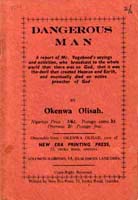|
Click Cover to View (W.B. Yeats, Certain Noble Plays of Japan. Essays and Introductions. New York: Collier Books, 1977. p. 225.) S�i�m�p�l�i�c�i�t�y� �i�s� �a�n� �I�g�b�o� �v�i�r�t�u�e�.� � �A�s� �s�y�m�p�a�t�h�y� �i�s� �a� �c�o�n�s�o�l�a�t�i�o�n� �t�o� �t�h�e� �C�o�n�f�u�c�i�a�n�,� �a�n�d� �c�h�a�r�i�t�y� �t�o� �t�h�e� �C�h�r�i�s�t�i�a�n�,� �b�r�i�n�g�i�n�g� �s�p�i�r�i�t�u�a�l� �a�n�d� �s�o�c�i�a�l� �c�o�n�c�e�r�n�s� �d�o�w�n� �t�o� �t�h�e�i�r� �b�a�s�i�c�s� �i�s� �a� �I�g�b�o� �a�i�m�.� �O�k�e�n�w�a� �O�l�i�s�a�h�,� �o�n�e� �o�f� �O�n�i�t�s�h�a�'s� �g�r�e�a�t�e�s�t� �e�x�i�s�t�e�n�t�i�a�l�i�s�t�s�,� �f�r�e�q�u�e�n�t�l�y� �c�autions us to the perils of romantic notions confusing practical solutions. For all the doggerel of his evangelical didacticism, his forewarnings argue against the presumptions imposed by the world without. Dangerous Man: Vagabond Vs. Princess is Olisah's story of the confidence man, St. (Mr.) Emmanuel Innocent (formerly Mr. Vagabond, nicknamed Dangerous Man), whose motto was "Man No Talk Lie, Man No Get Money." "Money, he said, could only be captured by telling lies; cheating others dishonestly, insincerity, kidnapping and possible unclean ways." A drama takes place in the "Theocratic Court," where he is reformed from agnosticism by "Three ugly men with monkey faces carrying daggers, dane guns, arrows, axes, swords and sharp matchetts, arrested for his activities against God." The twenty-one titles by Olisah in my collection include some of the most profound: No Condition Is Permanent, Money Hard to Get But Easy to Spend, Man Has No Rest In His Life (Since the world has broken into pieces, truth is not said again), About the Husband and Wife Who Hate Themselves and Trust No-Body In Time Because Human Beins Is Trickish. Writing as The Strong Man of the Pen, Olisah wrote the pamphlet Life Turns Man Up and Down: Money and Girls Turn Man Up and Down and tells us on the title page of his Money Palaver, he obtained his title, M.L. (Master of Life) "at the commonsense college, where he passed very hard lessons in money mastery and life problems." The linguistic direction of the 1950s and 1960s in Igbo literature, and the determination of its literary, cultural, and moral artists, retained essences of the ageless oral world only the pamphlet authors could convey. Before Onitsha's English writers, there were the Igbo writers Omenuko and Ije Odumodujere yet they never influenced the direction of modern Igbo fiction. Later there was People of the City, Things Fall Apart, The Only Son, and Blade Among the Boys, yet they never inspired the masses with popular taste, reading culture and habits or moral conducts. The Onitsha masters of useful advice - Olisah, Money Hard, Highbred Maxwell, Rufus Okonkwo, etc. - frequently exceeded the audacity of Amos Tutuola with their didactic diatribes. Their zealotry respected no party line and seems meant to do no more than provoke a reaction. Their belligerence, if no better articulated than a punk rocker’s, is imaginatively phrased. Such is their charm. We can hear the talk of actual life in the virile idiom employed by both the naïf writers of London in the sixteenth century and Onitsha in mid-twentieth century Africa. Telling as they are of the vernacular's expression, street writers do not write the way they speak. The Igbo language’s rhythm and pitch, at odds with the harmony and tone of English, transliterates to a reeling and writhing grammar. Onitsha pop prose stylists stretch speech into poesy. They are looking for effect and are affectionate of their punctuate print. Listen for assonances of near rhyme and hear the fundament of the Word. In Dangerous Man, Olisah's Igbo fundamentalism assimilates Christianity's responsibilities, here collected in an evangelical dream of 1907. Return to Main Page |
